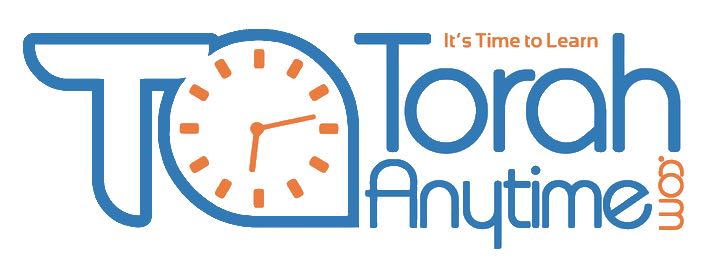Parashas Devarim
/Whenever I get a new group of students for my Parshas HaShavua shiur, I always ask them the same question. Why learn Parsha? Some weeks you have to race through a double parsha, other weeks you have less than fifty possukim. Wouldn’t it be more efficient to start at the first possuk and work your way through the entire Torah in depth, making sure that you learn each possuk properly until you really understand it? Why this forced march through the Torah?
Each time I find there are certain answers that are always offered. Some students suggest that this method makes sure you see the entire Torah at least once a year. If you went possuk by possuk, for example, you might not finish for many years (or if you learn it very thoroughly, ever). Others maintain that there is a value to all the Jewish people learning the same thing at the same time. It has a unifying effect (except when we in Eretz Yisroel get a parsha ahead of those of you in Chutz LaAretz, but that’s the exception that shows the benefit of the rule).
Both of those answers are correct and both can also be said about Daf Yomi. By all the Jewish people moving through Shas every seven years, often at a breakneck speed, it guarantees that everyone will see Shas to some extent. It also gives those participating a sense of unity and camaraderie. My father-in-law, Rabbi Moshe Ganz, has been doing Daf Yomi for cycles (to Daf Yomi people, “years” means nothing). He began learning it with Rav Margolis in Kew Garden Hills who learnt the first Daf Yomi in Lublin with Rav Moshe Shapiro.
But Parshas HaShavua has a deeper purpose. The Parshas HaShavua is, quite literally, THE Parsha of the week. The week in time is captured by the Parsha read that week. As such, it is not by accident that the Parshiyos of Yosef and his brothers always come out around Chanukah. Many of the seforim discuss thie connection. Parshas Bamidbar is always read on the Shabbos before Shavuos, Netzavim before Rosh Hashana, and of course, Parshas Devarim is always read on Shabbos Chazon, the Shabbos before Tisha B’Av.
There are many connections to Tisha B’Av and Parshas Devarim. A quick glance at the wonderful collection of seforim that specialize in parsha votlech will reveal some of them. I would like to concentrate on one connection that will perhaps give us a focus for the upcoming days and perhaps allow us to begin to lay the foundation for the geulah inside ourselves.
Sefer Devarim begins with what has been described as Moshe Rabbeynus farewell address to Klal Yisroel. That is not a fair description for a sefer in the Chumash. Obviously, every word is considered kodesh and the Word of Hashem. I believe a more accurate description would be Moshe Rabbeynu’s Mussar Shmooze to klal Yisroel. And in fact there are a number of references in this week’s parsha on the subject of giving Mussar.
Rashi tells us that Moshe Rabbeynu waited till the end off his life to chastise the people. Before that, Moshe was afraid that his words of rebuke would make people uncomfortable to approach him. Some people might even be driven away. Rashi compares it to Yaakov Avinu. “Reuven, my son”, Yaakov says, “if you are wondering why I haven’t said anything all of these years it’s because I didn’t want you to leave me and go live with your Uncle Eisav”. Now how could Yaakov think that any of the Shivtei Ka would go to Eisav HaRasha? Didn’t they know he tried to kill them? And why Reuvain? Why doesn’t it say Yaakov said this to Shimon or Levi?
I think that Yaakov saw the effect his words would have on Reuvain specifically. Once Reuvain realized he had lost the B’chora, that would give Aisav an opening. “Reuven, my nephew”, he might say, “I know how you feel. Your father did the same thing to me. He seems to have a problem with firstborns. Why don’t you come and stay with me for a while, and we can commiserate together”. Yaakov understood the danger of Reuvain feeling embarrassed and alienated. I don’t belong here, I’m not wanted.
The Baalei Mussar develop this point further. “ויהי כאשר תמו כל אנשי המלחמה למות מקרב העם. וידבר ה' אלי לאמר.”And after all the fighting men died from among the people, Hashem spoke to me saying”. Rashi comments on the juxtaposition of these two possukim. Hashem didn’t use the term וידבר in speaking to Moshe all 38 years that the decree was hanging over the heads of B’nei Yisroel. Rather he only used the term ויאמר. What Rashi does not explain here is the significance of the term וידבר as opposed to the term ויאמר. However, he explains it in a number of other places (i.e. the beginning of וארא). וידבר is a לשון קשה. It’s tough talking.
Now it would seem that the opposite would be true. When Hashem was upset at us in the מדבר, that was the time to talk to us tough. To show His angry face. But instead we are told that Hashem didn’t start talking in a hard way until He was no longer upset with us! The idea is obvious and powerful. You can’t talk tough unless you love someone. Someone you are upset with, you have to speak to them softly. Before you can show an angry face or express disapproval, the person you are addressing has to know you love them.
We are living in special times. Historic times - powerful and difficult times. We are seeing things that past generations couldn’t have imagined. Technological wonders. Torah study spreading throughout our people. The frum community expanding at an exponential rate. And yet…
Where can one go today and not hear about people feeling alienated? How many people can say they feel they belong to a kehilla? Do people feel they have a Rav who ispart of their life? How many people feel they belong, that they have their place in Klal Yisroel? We know that if we open a frum publication these days we will read heartrending stories of children going off. Kids who say they feel alienated. That no one understands them.
Are they representative or a limited phenomenon? I read a “Letter to the Editor” recently in the HaModiah that pointed out that we have heard enough about the teens at risk. It’s not something that applies to everyone, only a small minority. Let’s talk more about our regular kids. All right then, let’s talk about the regular kids.
Does our present chinuch system make the “regular kids” feel loved and appreciated? Do we empower them to believe in themselves? Does the average frum child (and adult for that matter) feel that HaKadosh Boruch Hu loves them? Or do they feel that Hashem is disappointed with them? Every parent knows the answers to these questions only too well. At present, kids aren’t feeling too good about themselves. And I mean the normal ones.
There is a family that lives in Yerushalayim who has a daughter in a Bais Yaakov elementary school. She was playing, as little girls sometimes do, dressing up. Unfortunately, she forgot to remove the clear nailpolish she had put on before she went to school the next morning. The principal sent the child home, and she was, obviously, distressed and embarrassed. I might have handled the situation differently, but I understand that a school has to maintain standards and sometimes a powerful message has to be sent. The mother called the principal and said “I support what you did and I have spoken to my daughter. But now she is hurt and embarrassed. When she comes back to school tomorrow, could you make an effort to smile at her?” The principal responded that she couldn’t do that. If she smiled at her, she would have to smile at all the children. The mother was incredulous. “So why don’t you smile at all the children?” The principal sighed and explained that she was an American and doesn’t understand how things work here.
An isolated case? I have been approached by dozens of parents, wanting to know why every Girls High School in Yerushalayim has at least one stern looking woman to scrutinize the girls as they walk in every day. Is everything just so? Because if not, the message will be given, sometimes subtly and sometimes not so subtly, that maybe you don’t belong in our school. Don’t belong in our school? Because a button wasn’t right, or the earrings were wrong or in one case, the girl had written on her schoolbag? “But I wrote מאמרי חז"ל” the girl protested feebly. “Those belong in your head, not on your bag” she was told. I spoke to the girl and asked to see what she had written. Things like לא עליך המלאכה לגמור, the first two lines of Mesillas Yesharim. Not exactly incendiary stuff. I will even grant that the inspector had a point. But did the girl feel the וידבר was coming from love? One mother, feeling for her daughter said to me “I don’t mind if they hire a woman to frown at the girls as long as they also hire one to smile at them!” Even a וידבר should be tempered with a ויאמר.
I know that many people will be disturbed by what I’m saying. It hits too close to home. But I don’t think anyone will be surprised. Speak to the English speaking Gedolim and ask them how many hours they spend holding families together after they have been told “we don’t want you. Go back where you came from”. In fact, I was told by an אדם גדול to discuss these issues publicly. “You have a forum,” he told me, “why don’t you use it?”
And let’s face it. It’s not only the English speaking public. This year, hundreds of eighth grade girls didn’t get into high school. Not bad girls, just girls who, nebech were average. Who needs average? There are five girls clamoring for every spot in the High Schools here. Or perhaps they were girls without protexia. You know, that cute little word we use here because “corruption” sounds too harsh. Protexia. “Why should I wait in line, my cousin works here.” “My brother-in-law used to be chavrusa with the minahel.” I spoke to a Rosh Yeshiva recently and he told me he was using protexia to get his daughter a teaching job. “Not because she needed it”, he assured me. “Just to cancel out everyone else’s protexia.”
Now, what do you think it does to a twelve or thirteen year old girl when they find out they can’t go to High School. HIGH SCHOOL! A nice girl, a girl who follows the rules. It says, we don’t want you. We don’t need you. Can we continue with things this way?
Okay my friends in Chutz La’Aretz, don’t think I’ve forgotten about you. A friend of mine recently turned down a teaching position in England because he was told he wouldn’t be able to get his kids into school. I was at a dinner in London where I had the z’chus to sit at the same table with an Adom Gadol. He told me with pride that in London there were many different chinuch options. A fellow at the table said, somewhat cynically, “yes, but you can’t get into any of them”. This Adom Gadol responded that Rabban Gamliel had closed the Bais Medrash so that only those who were תוכו כבורו, whose insides matched his outside, could get in. How then, he asked us, could anyone get in? Who could check something like תוכו כבורו? He responded brilliantly – they didn’t let in anyone! But someone who was תוכו כבורו found a way in. They climbed in through a window or down from the roof. So too, he said, in London today. If they tell you no room and you accept it then you’re not that serious. But if you keep pounding on the door, or look for a side entrance, anyone can get in anywhere.
True, I thought, but at what cost. How many of us today are תוכו כבורו? How do I tell that to a friend and michanech who couldn’t get his daughter into school? Do I tell him he’s not serious enough, as the tears are flowing down his face?
I have friends in America who tell me they agonize over whether their children will get into elementary school, others about high school, still others about seminary. And they’re not even up to shidduchim yet!
And once they’re in school? A girl who teaches in a Bais Yaakov High School in the New York area told me about a ninth grade girl who asked some basic questions about Emunah to the Rav who was teaching her class. He exploded. “A kofer! We have kofrim here! What kind of a Bais Yaakov allows kofrim to stay here!” The teacher asked my opinion of the situation. How, I wondered, could a ninth grader be a kofer! Do you know what it takes to be a kofer? Can’t we answer their questions without beating them down and calling them names?
A nice chassidishe lady, married to a boy living in Meah Shearim, told me that when she was in school, the Minahel didn’t allow his daughter to play with her. “I asked too many questions” she said sheepishly. Too many questions? Well it doesn’t take too much for us to discard children, does it? Say the wrong thing, wear the wrong thing (I’m not talking about tznius), be seen by someone who never got to read the beautiful and powerful book “The Other Side of The Story”, and you’re finished. Forever. Branded and discarded. I’m not talking about the kids who leave. I’m talking about the ones who stay, the normal kids, who end up feeling so poorly about themselves.
Tisha B’Av is the anniversary of the meraglim. How did it all start? Moshe Rabbeynu tells us this week. In פרק א' פסוק כ"ב we read ותקרבון אלי כולכם “you all approached me” on which Rashi comments בערבוביא, in a mob. Everyone was pushing each other in a panic. The thought that thay could capture Eretz Yisroel was too much for them. They didn’t think they were strong enough, good enough or deserving enough. Rav Yaakov Kaminetzky points out that the reason the חטא of the meraglim is seen as related to the חטא העגל, the sin of the Golden Calf, is because both represented a lack of Klal Yisroel’s ability to have confidence in themselves. To trust that they were worthy in Hashem’s eyes. That is the foundation of the golus, of the Churban.
And today we wait desperately for redemption. Who? That troublemaker? That little girl whose family was turned down from school because someone told them that her four-year-old brother was a wild kid and the family was no good? Which of us can stand up to the scrutiny of those who would dismiss us all (well, most of us anyway).
I am writing with the assumption that none of the people who hold the reigns of power are reading. I’m speaking to simple people like myself. No school calls me to discuss policy, no Ballabus asks my opinion on how to run their organizations. I’m a simple person. What can we do to reinstill the love necessary to allow our injured people to believe in themselves – to believe that we are worthy of redemption?
Before I go any further, let me point out that as an avid reader of the English HaModiah, I feel that this paper is providing an invaluable service. The HaModiah manages to be a light in an otherwise dark world and fills it with warmth and caring. Every week when my family and I read it, there are always stories, vortlach or just the way they present the news, that fills a person with hope and empowers its’ many readers. But I digress. What can we do besides reading the HaModiah?
The opportunities are all around. The neighbors kids are making noise while we’re trying to sleep, they don’t discipline them well enough, we know that people don’t respond to criticism. Are they bad paople or perhaps people who are overwhelmed? If it were our children would we have just a little more patience and understanding (I know, sometimes even less)? The person who cuts us off when we are driving, interrupts us when we’re speaking – these opportunities for loving people and believing in them when no one else will surround us daily. Let’s try to behave in our own lives the way we want to see the people in charge treat us and our children.
Let’s love each other and be accepting, like our lives depend upon it. Because it does.
May we all be zoche to an emese geulah and no more suffering.
Good Shabbos!





